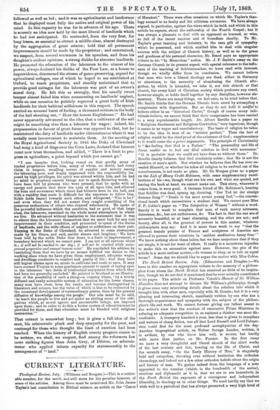CURRENT LITERATURE.
Theological Review, Silly. (Williams and Norgate.)--This is a notice- able number, for the merit, and still more for the peculiar interest, of some of the articles. Among these must be mentioned Mr. John James Taylor's last contribution to Biblical science, an article on the "Canon of Muratori." There were often occasions on which Mr. Toiler's theo- logy seemed to us faulty and his criticism erroneous. We have always argued, in particular, against the views which he held, and which in this article he repeats, about the authorship of the Fourth Gospel; but it was always a pleasure to deal with an opponent so learned, so wise, so fall of the rarest candour and of boundless charity. To Mr. Taylor's great learning and industry, to the rare gift of sympathy which he possessed, and which enabled him to deal with singular success with the subject of Church history, as well as to the grace and goodness of his personal character, Mr. Beard pays an appropriate tribute in his "In Memoriam" notice. Mr. J. F. Smith's essay on the German Church in its present aspect, with special reference to the influ- ence of the teaching of Schleiermacher, we have read with interest, though we wholly differ from its conclusion. We cannot believe that men who love a liberal theology are dead, either in -Germany or elsewhere, to the necessity of abandoning the Church alto- gether, by which is intended, we take it, not this church or that church, but every kind of Christian society which professes any creed, however simple, or holds itself together by any discipline, however ele- mentary. There are many things, we feel sure, to be tried before that. Mr. Smith thinks that the German liberals have erred by attempting a compromise with dogmatism. But as they do not hold it needful to believe either in an "historical Christ," though of course many indi- viduals believe, we cannot think that their compromise has been carried to a very reprehensible length. Dr. Albert Ravine has a paper on "Religious Sentiment and Religious Conviction," very ingenious, though it seems to us vague and unsatisfactory. The basis of religion he takes to be the idea in man of an "infinite perfect." Thus the fact of religion would be the chief proof of the existence of God ; supplementary to it would come the a priori arguments. The principle of Christianity is "the feeling that God is a Father." "The personality and life of Jesus enable us to feel our filial relation to God with assurance." "It is probable that we could not have done so without them." Dr. Reville clearly believes that God absolutely exists; that He is not the creation of man's spirit. But whether be believes that He has ever re- vealed Himself, or whether he takes all religion to be evolved out of the consciousness, is not made so plain. Mr. De Morgan gives us a paper on the Life of Henry Crabb Robinson, with some supplementary recol- lections of his own, though what are his own and what are quoted, not having the book at hand, we cannot make out. This story, wherever it comes from, is very good. A German friend of Mr. Robinson's, hearing that Schiller was dead, sprang up, shouting, "Der Tod 1st der einzige dumme Jung !" "Death is the most arrant young fool,"—the conven- tional insult which necessitates a student duel. We cannot pass Miss- F. P. Cobbe's paper on "The Subjection of Women" without a word. Surely it is weak to complain that men of rank marry actresses, dansenses, dm., but not authoresses, &c. The fact is, that the one are of necessity beautiful, or at least charming, and the other are not ; and beauty, after all, is the greatest of powers in this matter, whatever philosophers may say. And it is more than weak to say "that the greatest female painter of France and sculptress of America are allowed to pursue their vocations in 'maiden meditation fancy free.'" We know nothing about these ladies, but we dare conjecture that if they are single, it is not for want of offers. It really is a monstrous injustice to make this an accusation against men. However, the gist of the article is a more serious matter,—Is woman to obey, or to rule on equal terms? Some day we should like to argue the matter with Miss Cobbe.






























 Previous page
Previous page